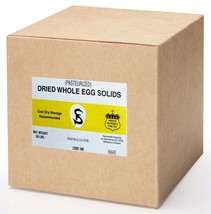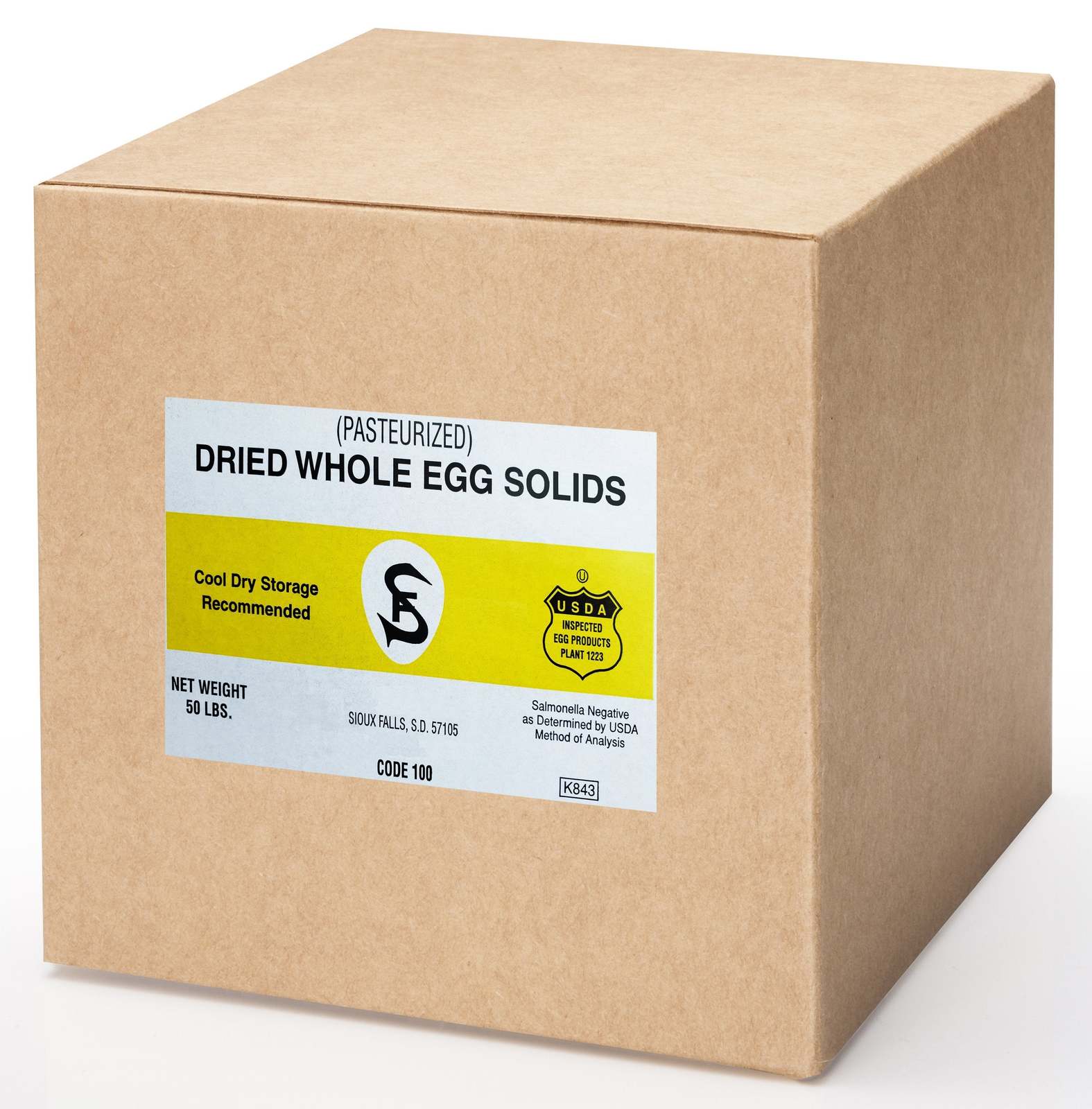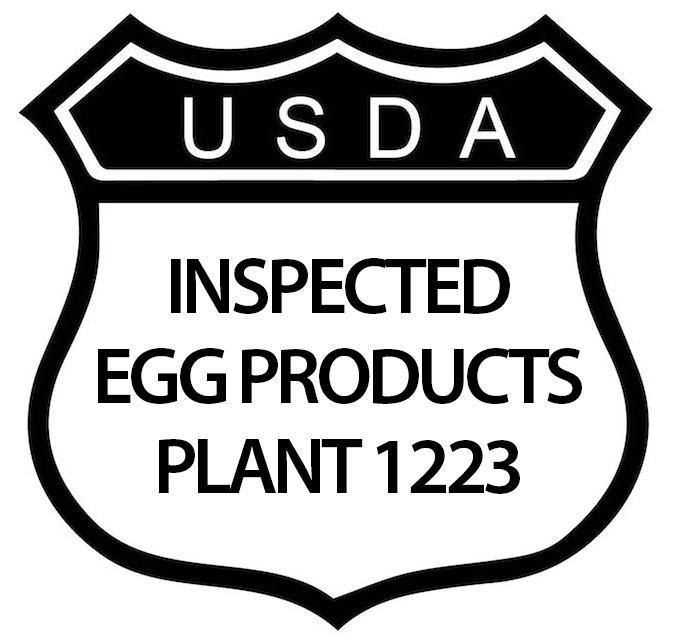Item details
More about this item
Product Overview
Throughout history, eggs have been considered one of the perfect foods.
- Just one egg is a great source of 14 vitamins and minerals, such as choline, lutein, vitamins A, D, K2, phosphorus, selenium, and potassium.
- Delicious powdered Eggs make the perfect emergency survival food for total nutrition
- Eggs are most beneficial due to their highly digestible protein content.
- The whole egg is a highly nourishing food that delivers a unique profile, providing nutrition hard to find in any other food.
- Eggs deliver the perfect mix of high-quality protein with a complete and well-balanced amino acid profile and highly nourishing fats with a unique fatty acid profile
Eggs have been around since the beginning of human history, nourishing families from generation to generation, and were known as a food that embodied the essence of life.
Because eggs represent life in various development stages, they have always been considered a symbol of long life and immortality. Eggs also have a powerful relevance to how the universe was created. Early myth-makers believed that the universe was hatched from an egg laid by a mythical creature. It was also believed that because the sun is the source of all life, the round yellow yolk symbolizes the sun, thereby making eggs the food of life. For many centuries, this perfect bite-sized food was considered an “easy food for survival.” There is no hunting involved with eggs, and most importantly, they don’t fight back. But watch out for those sharp chicken beaks.
A Perfect Protein Source
Proteins are food that contains a complete profile of essential and nonessential amino acids.
There have been 20 specific amino acids identified that are needed for human growth and metabolism. First are the essential amino acids.
For a protein to be considered complete, it must contain all 9 essential amino acids. The reason, the body can’t make them so, they must be obtained from food. The 9 essential amino acids are histidine, Isoleucine, leucine, lysine, methionine, phenylalanine, threonine, tryptophan, and Valine. The absence of these essential amino acids will compromise the tissue's ability to grow, be repaired, and maintained.
Next are the nonessential amino acids. These are amino acids which the body produces on its own. Therefore, we do not need to get them from food. The nonessential amino acids are alanine, asparagine, aspartic acid, and glutamic acid.
Last but not least are the conditional amino acids. These are essential in illness and high stress in supporting our foundational needs. The conditional amino acids include arginine, cysteine, glutamine, tyrosine, glycine, ornithine, proline, and serine. What makes the protein content in eggs so unique is whether you eat them whole or separated as the white or yolk, they are both quality sources of complete protein.
How Eggs Are Measured for Protein Quality
Most people are aware that eggs are a wonderful protein source; the high-quality protein that eggs provide is not so well known. There are many different ways to measure the quality of protein in food. Regardless of which test is being used, eggs always seem to hold their own and are often considered the best quality sources. The protein digestibility corrected amino acid score is a method of evaluating protein quality based on humans' amino acid requirements and their ability to digest each specific type of protein. This test is scored using a scale going from 0-1, and to no surprise, eggs score a 1, which makes them a perfect protein source. Another way of determining a protein source rate of efficiency is to look at the biological value. The purpose of looking at biological values is to measure how well one can absorb protein from a specific food source. This is scored from 0-100, and again, eggs stand out on top with a score of 94 which, is higher than beef, milk, and fish. I think it is safe to say; eggs can hold their own against some of the best protein sources.
While eggs are a complete protein source, these tasty bite-size treats bring much more to the table when nourishing the human body. The beautiful golden yolk, which the “cholesterol myth” crowd is so afraid of, is the part of this food that provides the greatest nourishment.
The average yolk of one large egg contains approximately 3 grams of protein, 190 mg cholesterol, 0.5 grams of carbohydrates, and 5 grams of fat. The yolk is (as stated above) a complete source of protein, for starters. Next, egg yolks are a wonderful source of your fat-soluble nutrients (A, E, K2) and not to mention the king of the fat-soluble nutrient world, vitamin D. They are all found in nourishing levels within the egg yolk. In case you were wondering why the egg yolks are yellow, that golden ball of deliciousness is also a source of some potent antioxidants like lutein and zeaxanthin from the carotenoid family.
As if that was not enough to make you eat a dozen eggs right now, they are also a nourishing source of the minerals calcium, phosphorus and potassium, and vitamins B1, B2, B5, B9. Finally, let’s not forget one of the star nutrients which makes this food so good for the brain; Choline.
But wait, there’s even more ...
That creamy, delicious yellow center supplies the body with a unique and nutrient-dense fatty acid profile. According to the national research council, of the 5 grams of fat found in the egg yolk, around 3 grams are poly and monounsaturated fatty acids (47% Oleic acid, 16% Linoleic acid, 5% Palmitoleic acid, 2% Linolenic acid). The remaining 2 grams are a nourishing, high-quality saturated fats source (23% Palmitic acid, 4% Stearic acid, 1% Myristic acid).
Egg yolks are a quality source of a phospholipid found in animal and plant foods called lecithin. A large egg contains about 9% lecithin. While lecithin is naturally produced in the body and used for many important functions like supporting a healthy liver and being essential for every cell membrane's optimal function in the human body, making sure you get the quality source in your diet is essential.
Eggs are not 'Genetically Modified (GM)' food. This includes shell eggs and eggs used for processed egg products. Only traditional breeding techniques are used to produce laying hens in the United States; neither chickens nor eggs are modified by genetic engineering. Even when a laying hen eats genetically engineered feed, the hen's digestive processes destroy any products unique to genetic engineering. Scientific research has confirmed that none of the genetically engineered materials are passed into the egg.
Lean Factor always redefines what it means to be a superfood, and the incredible edible egg is on the top of that list. A high-quality protein source for building and maintaining healthy tissue and a fat source that nourishes every cell membrane of the body. If that does not define a superfood, we don’t know what does.
Some possible traditional uses of Whole Egg Powder (with Yolk) may include:
- Source of protein, including all 9 essential amino acids
- Non-GMO and hormone-free
- Possibly promotes maintaining lean body mass
- May support brain health and cognition
- May support a healthy memory
- Choline content may prevent congenital disabilities
- May support a healthy pregnancy
- May support healthy eye functions
- May promote glycemic control
- Possibly supports healthy HDL levels
- Possibly promotes satiety and a healthy weight
- May support healthy bones and muscles
- May support normal liver functions
- Great source of choline and lutein
Constituents of Egg Protein Powder (with Yolk) include:
- Minerals: Calcium, Iron, Magnesium, Phosphorus, Potassium, Sodium, Zinc, Copper, Manganese, Selenium, Fluoride
- Vitamins: Vitamin B-12, Vitamin B6, Vitamin A, Vitamin C, Vitamin D, Vitamin E, Vitamin K2, Thiamin, Riboflavin, Niacin, Folate, Pantothenic Acid, Choline, Betaine, Lutein and Zeaxanthin, Lycopene, Tocopherol, Carotene, Cryptoxanthin, Retinol
- Amino Acids: Tryptophan, Threonine, Isoleucine, Leucine, Lysine, Methionine, Cysteine, Phenylalanine, Tyrosine, Valine, Arginine, Histidine, Alanine, Aspartic Acid, Glutamic Acid, Glycine, Proline, Serine
Our Whole Egg Powder is great for
Dry blends:
- Soups
- Baking
- Sauces
- Gravies
- Marinades
- Entree dishes
- Side dishes
- Hot dogs
- Deli Meats
- A base for reaction flavors
Suggested Use: To reconstitute one egg, mix 2 tbsp Whole Egg Powder with 2.5 tbsp of water and use this to make scrambled eggs or any other dishes with eggs. Or add 2 tbsp of Whole Egg Powder to your favorite smoothie, protein shake soup, or other dishes.
Mixing suggestions: To increase flavor and nutritional profile, combine with Extra Rich, Raw, Organic Cacao Powder, Organic Coconut Milk Powder, Gelatinized Maca Root Powder, and Hydrolyzed Collagen Powder.
This product is 100% natural and minimally processed: Taste, smell, texture, and color may vary from batch to batch.
Please Note:
- This powder naturally tends to clump.
- If clumping occurs, lay the bag on a flat surface and place a towel over the bag.
- Then pound on the bag until the clumps break up.
- The towel will help protect the bag from damage.
Miscellaneous facts about our Egg Protein Powder (with yolk)
Ingredients: Cooked Whole Egg (including Albumin).
Parts Used: Whole egg including yolk (no shell).
Origin: Raised and produced in Iowa, USA. Packaged with care in Florida, USA.
How to Maintain Optimum Freshness
- Lean Factor offers our Egg Protein Powder (with yolk) packaged in airtight stand-up, resealable foil pouches for optimum freshness.
- Once opened, push the air out of the pouch before resealing it to preserve maximum potency.
About Lean Factor
Please go here to learn more about Lean Factor and discover the important steps we take to bring you fresh, quality nutrition.
Bulk Quantities?
Need to order a large quantity of our products? We’d be happy to help! Please contact our Bulk department to discuss the details.
Taste, smell, texture, and color may vary from batch to batch. Go here to learn why our products may naturally vary.
Some Benefits of Whole Egg Powder
- Excellent source of protein
- It contains all 9 essential amino acids.
- Non-GMO and hormone-free
- Promotes maintaining lean body mass
- Supports brain health and cognition
- Supports a healthy memory
- Supports healthy pregnancy
- Supports healthy eye functions
- Promotes glycemic control
- Supports healthy HDL levels
- Promotes satiety and a healthy weight
- Supports healthy bones and muscles
- Supports normal liver functions
- Great source of choline and lutein
**Delicious Scrambled Eggs with Whole Egg Powder
Ingredients:
- 6 tbsp Whole Egg powder
- 3 tbsp water
- 5 tbsp heavy cream
- 2 tbsp butter
- Himalayan salt to taste
- Black pepper to taste
- Chives as garnish (Optional)
Directions:
In a small bowl, slowly whisk together the Whole Egg Powder, water, cream, salt, and pepper. On a skillet on medium heat, melt butter, and add egg mixture. As the egg cooks, stir it to keep it from sticking to the bottom and take off heat once it reaches the desired consistency. Once plated, sprinkle some chives for additional flavor and color. Enjoy!
 Powdered Eggs Bulk Size - 50 lb - Whole Egg Powder, White & Yolk Keto Friendly added to cart.
Powdered Eggs Bulk Size - 50 lb - Whole Egg Powder, White & Yolk Keto Friendly added to cart.
 Please wait while we finish adding this item to your cart.
Please wait while we finish adding this item to your cart.


